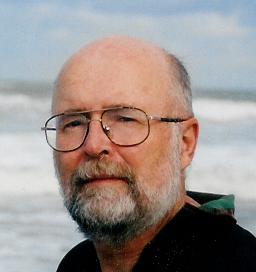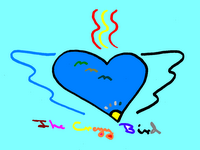 [Had some trouble posting and couldn't wait around because we went to see Springsteen and the Seeger Sessions Band -- tell y'all about that later! ]
[Had some trouble posting and couldn't wait around because we went to see Springsteen and the Seeger Sessions Band -- tell y'all about that later! ]There was this fellow, what you might think of as a sort of mad scientist -- except that he wasn't mad at all -- in fact, that was his tragedy.
He was a scientist, a quite excellent one. Actually, a rather rare bird, for he was well qualified in several scientific disciplines. He was also an excellent player of the lute and quite knowledgeable in art with a specialty in Russian Orthodox icons.
His name was Henry Widpis. That's a name you'd remember, had you heard it but once, and yet, it's not at all surprising if you've have never heard of him. The reasons for this will become obvious, as you hear his story.
Your "normal" mad scientist is occupied with producing or constructing some sort of ultimate weapon or infernal device of death and destruction. Henry didn't invent or build anything, he simply discovered an odd fact, a curiosity, which suddenly turned into hard reality.
He discovery was that a number of compounds, casually released into the environment by our industrial society and having found their way into the water supply, could have an unfortunate effect upon the mental condition of human beings.
As far I recall, that is, as far as I still can recall, there were a dozen or more such compounds. One of them was used to make toilet paper softer. Another made a fresh ham taste as if it had been properly smoked and smoked. A third prevented acne bumps and a fourth kept your breath fresh and clean "all-day-long".
The list is long and not really all that important -- not anymore anyway. In any case, I can't remember them all.
The point of Henry's discovery was that although each of these substances could be considered a pollutant, none of them was a serious problem in itself. However, with all of them were mixed together in our water supply, there was a possibility -- albeit, a most remote possibility -- that they might synergise each other. In theory, there was a chance that they might polymerize into a single compound. This compound, if ever formed, would, through "chain catalysation", almost instantaneously replicate this compound to water throughout the world.
The name of the compound was peripletic dyslexic quadalone-86 -- PDQ-86, for short.
If someone should drink a quantity of water containing PDQ-86, it would have an adverse effect upon their mentality. Both short- and long-term memory as well as the ability to coordinate comprehension and understanding of the world with sensory input would be impaired.
In common language: those who drank water contaminated with PDQ-86, would quickly go completely off their rockers, become bonkers, nuts, out-to-lunch -- in a word: they'd go mad!
There was, however, little chance of this ever happening.
In order for the chain polymerization to take place, a pre-catalyst was needed to initialize the reaction. Henry's studies clearly showed that the only one substance could initiate the chain polymerization of PDQ-86. This substance was something so rare as to be a purely hypothetical, if not an outright fiction -- the substance known as "red kryptonite".
Although apparently only of hypothetical interest, it was an interesting discovery, and Henry decided to publish his results. However, being occupied with other research, a few precious months slipped by before he got around to writing the paper and submitting it to a respectable scientific journal.
The article had just been submitted to the peer review board of what I think was called "Intentional Science" or maybe it was "Scientific Pelican" -- I'm sorry, but I'm not sure anymore. The point is that the article had not yet been published when events took a strange turn.
It was the comet.
"Sully'd-Wanker" was a rather small comet, recently discovered by Ahmed Sully'd and Philip Wanker. That it was found to be on a collision course with earth made a big splash in the news of course -- but fears were quickly allayed. It would not be "the end of the world". "Sully'd-Wanker" was just a dirty little dust ball, a bit of space-jism which would result in a shower of shooting stars when it hit the atmosphere -- and nothing more.
However, the day before the evening the meteor storm was calculated to take place, an odd detail about the comet made the news -- advanced spectral analysis showed that the comet contained significant amounts of red kryptonite...
The news announcer told listeners of course that there was no danger -- the red kryptonite only meant that the meteor shower would have an even more gorgeous display of color and posed no danger whatsoever.
Of course, Henry Widpis knew better. Unfortunately, he was the only one who knew!
If his discovery had been known earlier by the scientific community and astronomers had made their discovery known some months before, instead of a few hours, there might have been time to create vast cisterns of unpolluted water.
Poor Henry! He had made a discovery which could have "saved the world". But, the tyranny of events meant that he barely had time to save himself! He set about, of course, collecting fresh water in covered containers of every sort. By the time he had filled his rooms up with fresh water, it was late evening, so he went outside, pulled up a lawn chair and watched the meteor shower.
It was a magnificent show. A little after midnight it was over and he went to bed.
He woke the next morning hoping there was an error somewhere in his calculations. There weren't any. The effects of the red kryptonite with which the earth had been dusted were both quicker and more extensive than he had anticipated.
When the smallest particle of the substance fell into a body of water and PDQ-86 was formed, the polymerization spread to every body of water with which the it was physically connected. This meant that all water in the rivers and oceans contained PDQ-86 before the next nightfall. Rising with the water vapor and falling as rain, all water was soon contaminated.
PDQ-86 is nearly indestructible in much the same way as dioxin, and like that awful substance, once ingested almost impossible to excrete from the body. One could only wait for it to decompose. That it would decompose, of this he was certain, but the actual time frame was a bit iffy. It could be five years, it could be fifty years, it could be more...
All Henry could do was sip his bottled water and watch as the world went out of joint. Within a few days, the television and radio news became increasingly garbled and gibberished.
Then the news stopped, as did other utilities which could not continue without human attention.
The electricity was the last to go.
As far as Henry could determine the functional intelligence of human beings had fallen to a level not much higher than that of chimps and orangs -- which is somewhat misleading as these creatures are working at the full extent of their abilities.
Being careful when he moved among the now grunting mass of humanity so as to not to attract attention to himself, he was able to gather canned food and other provisions he needed.
He acquired an emergency lighting system so that he could read at night. He had to careful that no light escaped from his windows. Light attracted the creatures who had once been his fellow human beings. Before he had learnt this, he had to fight off and kill some of them.
He tried to help some of those who seemed to have some remnant of conscious intellect -- but it was of no avail. He was met with empty stares and only risked that they turned suddenly violent.
Finally, after about a half year, the loneliness became too much for Henry. He could no longer stand the pain of being the only sane person in a world full of crazy people.
So, he decided to take his leave of sanity also, drink of the contaminated water and get it over with. For he had begun to notice that the madness was beginning to affect him. At first he thought was due to the lack of social companionship...
Then he realized it was because of the fog.
Fog distilled from the waters of the rivers and seas contained the poison, although in small amounts. Each misty morning meant he breathed a bit of PDQ-86 into his body. Instead of watching his as his intellect slowly corroded, he decided to embrace the darkness in one fell swoop. And who could know? Perhaps there was a form of companionship in the madness?
Before he took the final, irrevocable step, he wrote this brief résumé describing the tragedy which had befallen the human race. His hope was that, if the madness lasted only a few years, perhaps, when awakening from their stupor, people could still read and perhaps understand what had happened and rebuild civilization.
He finished his story with these words:
"If fifty or a hundred years pass before PDQ-86 decomposes, there is little hope. The tendency of the crazy people to destroy the world around them seems to be accelerating at an ever faster rate. I can no longer bear to watch it, can do nothing to stop it and therefore will now join them...
"If you are able to read and comprehend this, congratulations! Treasure your sanity and remember me, Henry Widpis!"
"Skaal!"
"floobah"..."hopsnick"..."chowder powder's louder now!".....




No comments:
Post a Comment